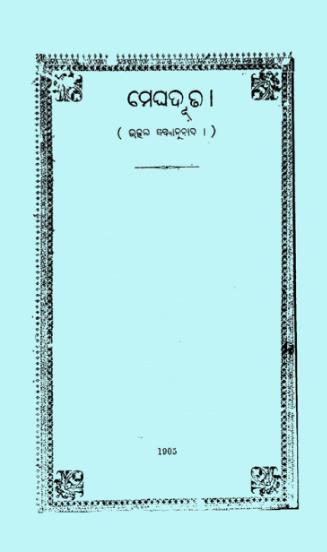Published in 1905, Kavya Meghaduta is a remarkable poetic work translated by noted scholar Dasharathi Bidyaratna. This book presents an exquisite rendition of the original Sanskrit poem Meghaduta (The Cloud Messenger) by the legendary poet Kalidasa. Bidyaratna’s translation is not merely a transfer of text from one language to another; it is an artistic endeavor that aims to capture the essence, beauty, and emotional depth of the original work, thus making it accessible to a broader audience.
The Meghaduta composed in the 5th century CE, is a seminal piece of Indian literature that vividly displays the themes of love, longing, and the power of nature. The narrative revolves around a yaksha (a celestial being) who is exiled to a distant land and sends a poignant message to his beloved through a cloud. The original poem is celebrated for its intricate imagery, lyrical quality, and profound emotional resonance.
By the early 20th century, as India was experiencing a cultural renaissance and a reawakening of interest in classical literature, Bidyaratna’s translation of Kavya Meghaduta provided an invaluable bridge to this rich heritage. It allowed readers who might not have been familiar with Sanskrit to engage with Kalidasa’s timeless themes of love and separation, thus fostering a deeper appreciation for classical Indian poetry.
Kavya Meghaduta explores several profound themes that have universal appeal. Primarily, it delves into the intricacies of love and the poignant pain of separation. The yaksha’s longing for his beloved serves as a metaphor for the human experience of yearning, making the poem relatable across cultures and eras. The cloud becomes a symbol of hope and connection, embodying the messenger’s role in bridging the distance between lovers.
Beyond love, the poem celebrates the beauty of nature. Bidyaratna’s translation retains Kalidasa’s rich descriptions of landscapes, seasonal transitions, and celestial elements, allowing readers to experience the vivid imagery that characterizes the original work. The interplay between the emotional landscape of the yaksha and the natural world enriches the narrative, emphasizing the unity between human feelings and the environment.
Bidyaratna’s translation of Kavya Meghaduta is notable for its lyrical elegance and artistry. He strives to maintain the rhythmic and metrical qualities of the original, capturing the musicality that is a hallmark of Kalidasa’s poetry. The deft use of imagery and metaphor creates a vibrant tapestry of emotions, inviting readers to visualize the scenes and feel the depth of the yaksha’s longing.
The translator’s careful choice of words and phrases enhances the emotional impact of the text, allowing contemporary readers to resonate with the eternal themes presented. The poetic techniques employed evoke a sense of longing and connection, leading readers through a journey that reflects both personal and universal experiences of love.
Kavya Meghaduta has continued to influence generations of poets, writers, and scholars. Dasharathi Bidyaratna’s translation introduced Kalidasa’s work to those unfamiliar with Sanskrit literature, cementing its place in Indian literary tradition. The themes of love, longing, and the beauty of nature explored in this translation resonate in contemporary discussions on relationships and emotional expression.
Books Info
| Books name | Meghaduta / ମେଘଦୂତ |
| Author | Dasharathi Bidyaratna, Tr. |
| No Of pages | 105 |
| Publisher | NA |
| Publication | 1905 |
| Printed At | The Kishor Press |
| Distributor | NA |

